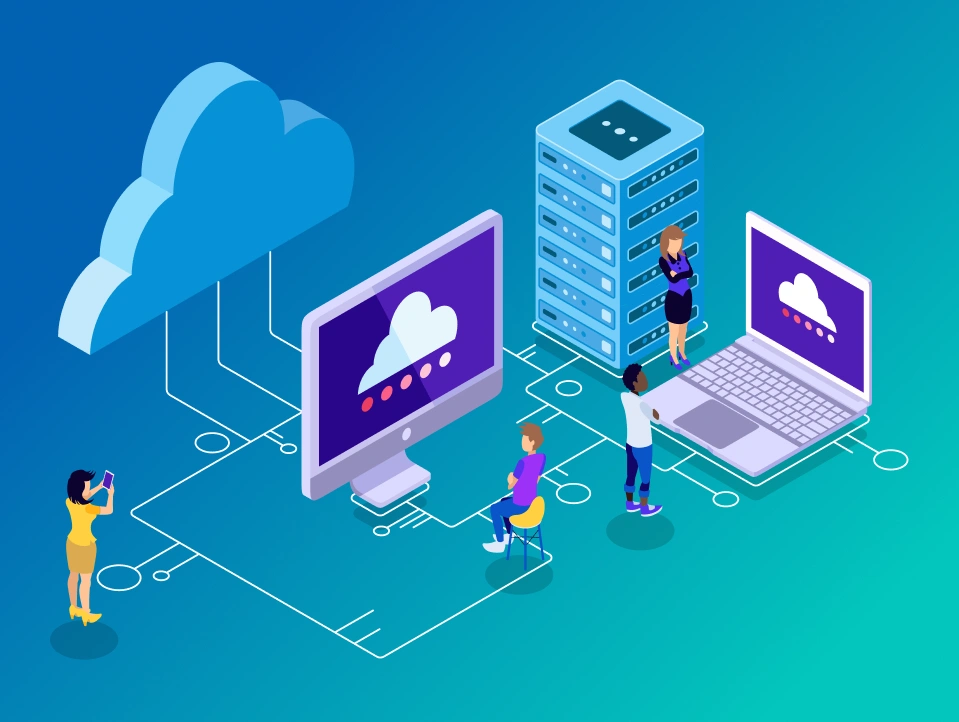
In the rapidly evolving business landscape, deciding between on-premise vs cloud solutions for your business can be extremely difficult, especially given the different benefits both offer. While businesses have long relied on the extreme level of control offered and customizations offered by the on-premise systems, cloud based infrastructure solutions have taken the world by storm in recent years, all thanks to their remote accessibility, low cost of setup, and better security.
In this blog, we will discover the key difference between on cloud and on premise solutions, and understand everything there is before choosing between cloud vs on premise.
While the differences between on cloud and on premise infrastructure solutions are manifold, in layman’s terms, on-premise and cloud software differ from each other in their location. On-premise software is owned and operated by the company on a self-hosted server, whereas cloud based software is stored and managed on the cloud service provider’s servers.
An on-premise system offers dependability, control, and security, whereas cloud based IT solutions offer greater levels of flexibility and cost-efficiency. So, it wouldn’t be surprising to see cloud computing solutions growing in popularity in recent years, given the lucrative cost and time-saving options they offer to enterprises.
On-premise IT infrastructure is where all the hardware, software, networking, and data storage components are stored and managed in-house by the company. This also entails that the applications and other elements can only be used on-site and not remotely. It ensures a greater sense of control of your IT components and better security.
A cloud based IT infrastructure is where all your IT components are hosted on a third-party server, often those of the cloud service provider, and are available on demand. Available in three different models, cloud based solutions usually include public, private, and hybrid cloud. Public clouds are owned and operated by a third party, which offers software, platform, and Infrastructure as a service. A private cloud is more like an on-premise system, exclusive to just one organization. The hybrid cloud model as the name suggests is a mix of both, making it highly flexible as well as secure.
As mentioned above, there are a lot of fundamental differences between an on-premise and cloud ecosystem, and choosing the one that suits your business the best completely depends upon your needs.
On-Premises: If you need your resources to be solely deployed in-house and within your enterprise’s infrastructure, on premises is your go-to solution. On-premise IT infrastructure is owned and maintained by the company, and is available only for deployments within the organization.
Cloud: Since in a cloud computing environment resources are hosted on servers of the cloud service provider, they can be accessed from anywhere across the globe, for as long as they want. However, this is only true for the public model. The private cloud functions a lot like an on-premise environment but with the capabilities of the cloud.
On-Premises: There is no denying the fact that on-premise IT infrastructure or software deployment is heavy on the budget. In this model, you are responsible for your IT environment, installing everything, managing it, and maintaining it for better performance. It involves taking care of everything from server hardware to power consumption and space.
Cloud: Cloud based IT solutions on the other hand give businesses the freedom to reallocate their resources to core business processes, rather than wasting them on the mundane tasks of upkeep of the infrastructure. With the cloud, you only need to pay for the service you use, and for the duration of usage.
On-Premises: In an on-premise setup, businesses retain all of their data and have better control over who accesses what. This is why businesses with sensitive data and security concerns think twice before jumping onto the cloud bandwagon.
Cloud: Ownership of data remains a grey area for both companies and vendors, in cloud computing environments. Since the data and encryption keys remain with the third-party provider, during downtime or major disruptions, you may not be able to access your data.
On-Premises: Regardless of where you decide to keep your applications, keeping the business data safe is of utmost importance to any business. However, for businesses in extremely regulated environments, that decision becomes fairly easy by keeping everything on their in-house servers.
Cloud: Security threats and breaches are very real when it comes to cloud computing environments. Private as well as public organizations have long struggled with security concerns posed by cloud environments, which ever more remain the main barrier to cloud computing deployment.
On-Premises: Companies that operate under strict regulatory environments and require adherence to regulations such as GDPR, or HIPAA, need better control over their data and stricter security protocols, making on-premises solutions the best option.
Cloud: Businesses with sensitive data that choose cloud based environments need to ensure that their cloud service provider is up to code and compliant with all the regulatory mandates for their industry. Even with cloud environments, keeping your data safe is an added effort that companies need to undertake.
The debate over the pros and cons of on-premise vs cloud environments is a never-ending one. Whether you are a start-up just kickstarting your business journey or a well-established enterprise looking to improve your operations, the choice hinges on the question: Which model best fits your unique business needs?
For this, one needs to closely understand the nuances of both cloud computing and on-premise solutions and make informed decisions. Or, you could simply opt for a mid-way, choosing the best of both worlds, cloud and on-premise; i.e. Hybrid Cloud Solutions.
A hybrid cloud solution features elements from different types of IT deployment models, such as on-premise, private cloud, as well as public cloud. With hybrid cloud solutions, businesses get to utilise their legacy systems in sync with new technologies, keeping their sensitive information safe with added flexibility.
Furthermore, hybrid cloud solutions are extremely scalable and cost-effective, allowing organisations to increase their computing power or storage capacity without installing additional hardware or software. In short, hybrid solutions offer a wide range of benefits that encompass the best of both on-premise and cloud computing environments, without compromising on the security of your IT infrastructure.
Thriving in the current digital landscape requires scalable, reliable, and secure infrastructure, whether cloud based or otherwise. Businesses need solutions that can be integrated with their legacy systems, and aid in faster and more secure data transfer, while providing end-to-end visibility. This is where GSS comes into the picture as your trusted digital transformation partner, helping you with solutions that suit both cloud based and on-premise infrastructure perfectly.
Whether it is Cloud Mobility Solutions, Digital Infrastructure Solutions, Business Continuity Solutions, or Managed Services, we can help you with it all.
All you need to do is get in touch with us today and our experts will assist you with choosing the right solution for your business needs.
The decision to choose between on premise IT solutions and cloud based IT solutions is a crucial one, which will impact the productivity and profitability of your business both in the short and long run. However, understanding the benefits of cloud vs on premise IT solutions can help you make an informed decision, and ensure you get your IT infrastructure tailored to best support your everyday business tasks, all while keeping costs under control.
Need help choosing the right IT infrastructure for your business? Get in touch with us via website, call or email.

Multi-Cloud vs Hybrid Cloud: Best IT Strategy for UAE 2025
Explore

The Hidden Costs of In-House IT vs Managed IT Services in the UAE
Explore

How Managed IT Services Are Fueling Growth for UAE’s Startups and Enterprises
Explore

How RPA, AI, and ML are Revolutionizing Business Operations
Explore

How to Choose the Right Enterprise Solution Support Partner for Your Business
Explore

Is Your Business Cyber-Resilient? How to Build Strong Defenses Against Cyber Threats
Explore

How Managed IT Services Drive Operational Efficiency and Cost Reduction?
Explore

Cloud vs On-Premises: Which Solution is Right for Your Business?
Explore